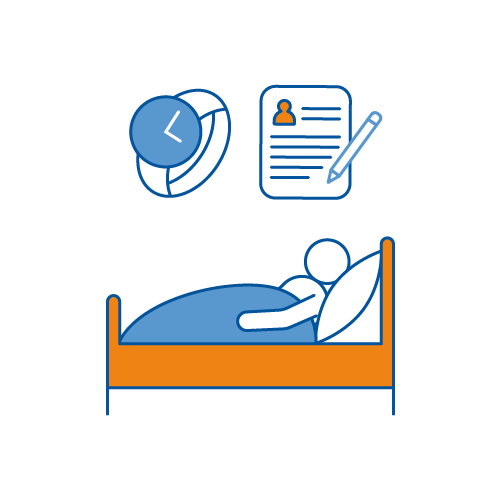Sleep Quality: Transform Your Nights with Simple Tips
Imagine waking up feeling refreshed, energized, and ready to conquer the day. Sounds fantastic, right?
Achieving this starts with improving your sleep quality. You might not realize it, but the way you sleep affects almost every aspect of your life, from your mood to your productivity. If you’ve ever tossed and turned at night or struggled to shake off that groggy feeling in the morning, this article is for you.
We’re going to uncover the secrets to transforming your nights into restful slumbers and your days into vibrant experiences. Dive in to discover how small changes can make a big difference in your sleep quality and overall well-being. You deserve to feel your best every day—let’s make it happen.
Importance Of Sleep Quality
Good sleep quality enhances physical and mental well-being. It supports concentration, energy levels, and emotional balance. Regular, restful sleep aids in maintaining a healthy immune system and improves overall mood.
Good sleep isn’t just about how many hours you spend in bed. The quality of your sleep is what truly matters. High-quality sleep can transform your day, mood, and overall health. When was the last time you woke up feeling truly refreshed? If it’s been a while, it’s time to focus on sleep quality.
Boosts Mental Health
Good sleep quality plays a critical role in maintaining your mental health. Poor sleep can lead to irritability and stress. Over time, this may contribute to long-term mental health issues like anxiety and depression. Imagine waking up feeling balanced and positive. High-quality sleep makes this possible by supporting your emotional well-being.
Enhances Physical Health
Your body uses sleep as a time to repair and rejuvenate. Quality sleep strengthens your immune system and helps prevent chronic illnesses. Think of sleep as your body’s nightly tune-up. Without it, you might find yourself catching every bug that’s going around.
Improves Cognitive Function
Quality sleep enhances your brain’s ability to process and store information. It improves concentration, problem-solving skills, and decision-making. Have you ever struggled to remember a name or complete a task efficiently? Chances are, poor sleep quality is to blame.
Increases Productivity
When you sleep well, you wake up ready to tackle the day. Quality sleep boosts your energy levels, making you more productive and focused. Consider the days when everything seems effortless. Those are often the result of a good night’s sleep.
Supports Emotional Regulation
Good sleep helps you manage your emotions effectively. It reduces the likelihood of overreacting or feeling overwhelmed. Have you ever snapped at someone without meaning to? Enhancing your sleep quality can help you maintain a calm and composed demeanor.
Promotes Longevity
Research suggests a strong link between quality sleep and a longer life. Consistent, restful sleep contributes to better overall health and longevity. Think about the years ahead. Prioritizing sleep quality today can lead to a healthier, longer life tomorrow. Are you ready to make sleep quality a priority in your life? Small changes can lead to big improvements. Start tonight and see how it transforms your days.
Creating A Sleep-friendly Environment
Improving sleep quality starts with a calm, dark, and quiet bedroom. Soft bedding and a comfortable mattress help relaxation. Removing electronic devices reduces distractions and supports better rest.
Creating a sleep-friendly environment significantly boosts sleep quality. It’s more than just a comfy bed. Your bedroom’s setup can deeply influence restfulness. Making small changes creates a peaceful oasis, ensuring you wake up refreshed.
Choosing The Right Mattress
The right mattress is crucial for restful sleep. It supports your body, easing pressure points. Select a mattress that suits your sleeping style. Side sleepers might prefer softer options. Back sleepers often need firmer support. Test different types in-store if possible. Comfort is key. And ensure it fits your bed frame.
Optimal Room Temperature
Room temperature affects sleep. Experts suggest keeping it cool. Around 60 to 67 degrees Fahrenheit works best. A cooler room helps your body relax. Use fans or air conditioning if needed. Heavy blankets can add warmth without overheating. Adjust bedding seasonally for comfort.
Reducing Noise And Light
Noise disrupts sleep. Soundproof windows or heavy curtains can help. Consider earplugs for a quieter environment. Light also impacts sleep. Darkness signals your body to rest. Use blackout curtains to block outside light. Dim nightlights for safety if needed. Keep electronics away from the bed to reduce blue light exposure.
Establishing A Bedtime Routine
Sleep quality is essential for good health and well-being. Establishing a bedtime routine can significantly improve your sleep. A structured routine helps signal your body that it’s time to wind down and prepare for rest.
Consistent Sleep Schedule
Maintaining a consistent sleep schedule can be a game changer. Going to bed and waking up at the same time every day helps regulate your internal clock. Notice how you feel more refreshed after a weekend of sticking to your usual bedtime.
Try setting an alarm for your bedtime as well as your wake-up time. This gentle reminder can help you stay on track. Consider how your mood and productivity might improve with regular sleep patterns.
Relaxation Techniques
Relaxation techniques can ease your transition into sleep. Consider activities like deep breathing, gentle yoga, or reading a book. Ever tried a warm bath before bed? It can relax your muscles and signal your brain to prepare for sleep.
Experiment with different techniques to see what works best for you. Listen to soothing music or meditate for a few minutes. Have you found a particular method that calms you before sleep? Share your experiences with friends who might benefit too.
Limiting Screen Time
Limiting screen time before bed is crucial. The blue light emitted from devices can interfere with your ability to fall asleep. Try setting a digital curfew one hour before bedtime to let your brain unwind.
Replace screen time with calming activities. Maybe you could start a journaling habit or engage in quiet conversation with a loved one. How might your sleep improve if you chose to disconnect from screens earlier?
Establishing a bedtime routine requires commitment and experimentation. You might be surprised at how small changes can lead to better sleep quality. What bedtime habits can you try tonight to transform your sleep experience?

Credit: beeyawellness.com
Nutrition And Sleep
Balanced nutrition plays a crucial role in enhancing sleep quality. A diet rich in vitamins and minerals supports restful sleep. Foods like nuts, fish, and whole grains help improve sleep patterns. Proper nutrition ensures the body gets essential nutrients for better rest and recovery.
Getting a good night’s sleep often feels like an elusive dream. However, what you eat during the day plays a significant role in how well you rest at night. Nutrition and sleep are closely linked, and understanding this connection can help you make better choices that improve your sleep quality. Have you ever noticed how some nights you sleep like a baby, while others leave you tossing and turning? It might be time to look at your plate.
Foods To Eat For Better Sleep
Certain foods can naturally enhance your ability to fall asleep and stay asleep. Almonds and walnuts are rich in melatonin, the hormone that regulates sleep. Cherries are also a good source of melatonin, and a small bowl before bed might do wonders for your rest. Bananas contain magnesium and potassium, which help relax your muscles and promote calmness. What does your evening snack look like? Try swapping it for these sleep-friendly options.
Avoiding Stimulants
It’s no secret that caffeine can disrupt sleep, but did you know it can stay in your system for up to 6 hours? Consider cutting back on coffee and energy drinks, especially in the afternoon and evening. Sugary foods and spicy meals can also interfere with sleep. They might cause discomfort or heartburn, making it harder to drift off. Reflect on your last meal of the day. Is it helping you wind down or keeping you awake?
The Role Of Hydration
Staying hydrated is crucial, but timing matters. Drinking too much water right before bed can lead to frequent bathroom trips, interrupting your sleep cycle. Aim to drink most of your fluids during the day. A glass of herbal tea, like chamomile, in the evening can be soothing without overwhelming your bladder. How balanced is your daily water intake? Adjusting it might just be the key to uninterrupted sleep. Eating the right foods, avoiding certain stimulants, and managing your hydration can make a significant difference in your sleep quality. Start by making small adjustments and notice how your nights transform.
Physical Activity And Sleep
Physical activity plays a crucial role in enhancing sleep quality. Engaging in regular exercise can help regulate sleep patterns and improve restful sleep. The type and timing of your exercise routine can significantly impact your sleep. Understanding these aspects can lead to better sleep outcomes. Let’s explore how different physical activities influence sleep quality.
Exercise Timing
The timing of exercise affects how well you sleep. Morning workouts can boost your energy throughout the day. Evening exercises should end a few hours before bedtime. This allows your body to cool down and prepare for sleep. Exercising too close to bedtime might make it hard to fall asleep. Finding the right exercise time can improve sleep patterns.
Yoga And Stretching
Yoga and stretching help relax the body and mind. These activities reduce stress and tension, promoting better sleep. Gentle yoga before bed can calm the nervous system. Stretching helps release muscle tightness, making you feel more comfortable. Incorporating these practices can lead to more restful nights.
The Benefits Of Regular Activity
Regular physical activity brings numerous benefits to sleep quality. It helps regulate the body’s internal clock, ensuring a consistent sleep-wake cycle. Exercise reduces feelings of anxiety and depression, common sleep disruptors. Regular activity also promotes deeper and more restorative sleep. By staying active, you can enjoy more refreshing and uninterrupted sleep.

Credit: www.amahahealth.com
Managing Stress For Better Sleep
Stress often hinders our ability to get quality sleep. Managing stress can lead to better rest. This section explores simple techniques to help you unwind. Discover practical ways to calm your mind and improve sleep quality.
Mindfulness Practices
Mindfulness helps you stay present in the moment. Focus on your breathing and surroundings. Pay attention to each inhale and exhale. Notice how your body feels. This practice reduces stress and promotes relaxation. Try setting aside 10 minutes daily for mindfulness. Gradually, you may notice improved sleep patterns.
Breathing Exercises
Breathing exercises calm the nervous system. Start with deep belly breaths. Inhale slowly through your nose. Hold your breath for a few seconds. Exhale gently through your mouth. Repeat this process several times. This technique slows your heart rate and soothes the mind. Practice before bed for a peaceful night’s sleep.
Cognitive Behavioral Techniques
Cognitive Behavioral Techniques help change negative thoughts. Identify stressors that disrupt your sleep. Challenge these thoughts with positive affirmations. Replace “I can’t sleep” with “I will rest well tonight.” Reframing thoughts can ease stress and anxiety. Practicing these techniques regularly can enhance sleep quality.
Technology And Sleep Tracking
Technology has changed the way we think about sleep. With a few taps on your smartphone, you can track how well you’re resting at night. But how reliable are these gadgets? And more importantly, how can you use them to improve your sleep? Let’s dive into the world of sleep apps and wearable monitors to see how they can help you understand your sleep patterns better.
Using Sleep Apps
Sleep apps are accessible tools that can transform your phone into a sleep tracker. They often use your phone’s microphone to listen for movements or sounds to gauge your sleep quality. Many users find the gentle alarm features a nice touch, waking them up at the lightest sleep phase. But do these apps really work? While they can’t match the precision of a sleep lab, they offer valuable insights into your sleep trends over time.
Start by trying a few popular apps, like Sleep Cycle or Pillow. Each offers different features, such as sleep stage tracking and nightly summaries. The key is to pick one that fits your lifestyle and stick with it. Track your results over a few weeks to notice patterns. How many times do you wake up during the night? What time do you fall into the deepest sleep? These insights can help you make informed decisions about your sleep habits.
Wearable Sleep Monitors
Wearable devices, like smartwatches and fitness bands, take sleep tracking a step further. They use sensors to monitor movements, heart rate, and sometimes even blood oxygen levels. This can provide a more comprehensive view of your sleep quality. But wearing a device every night might feel cumbersome for some. If you’re comfortable with it, wearables can offer a wealth of information.
Consider popular options like the Fitbit or the Apple Watch. These gadgets not only track your sleep but also give you feedback on your daily activity. They encourage a healthier lifestyle overall. Are you getting enough restful sleep to fuel your day? Use the data from these devices to find out.
Interpreting Sleep Data
Once you have the data, the real work begins. It’s easy to get overwhelmed by the numbers, but focus on key metrics like sleep duration and sleep efficiency. Look for trends rather than day-to-day variations. Is there a particular day of the week when your sleep quality drops? Maybe stress or late-night screen time is the culprit.
Use these insights to tweak your habits. Try adjusting your bedtime routine or reducing caffeine intake in the afternoon. The goal is to create an environment that promotes better sleep quality. Are you ready to turn those numbers into a better night’s sleep? With a bit of patience and experimentation, you can make technology work for you.

Credit: www.thensf.org
Addressing Sleep Disorders
Quality sleep is crucial for health and well-being. Yet, many face challenges due to sleep disorders. Addressing these disorders can significantly improve life quality. Let’s explore some essential aspects to tackle sleep disorders effectively.
Identifying Common Disorders
Sleep disorders vary widely. Insomnia involves trouble falling or staying asleep. Sleep apnea causes breathing interruptions during sleep. Restless leg syndrome creates discomfort in the legs. Identifying these issues is the first step to better sleep.
Seeking Professional Help
Consulting a healthcare professional can provide clarity. Doctors can diagnose and suggest personalized solutions. They may conduct sleep studies to observe your sleep patterns. Professional help ensures you receive the right guidance.
Treatment Options
Treatment depends on the specific disorder. Cognitive behavioral therapy is effective for insomnia. Continuous positive airway pressure (CPAP) can help with sleep apnea. Medication might be necessary for certain conditions. Lifestyle changes also play a vital role.
Frequently Asked Questions
How Does Sleep Affect Health?
Quality sleep enhances overall health by supporting brain function and physical well-being. It helps repair tissues, boosts immunity, and balances hormones. Poor sleep can lead to issues like obesity, heart disease, and mental health problems. Prioritizing good sleep is essential for a healthy lifestyle.
What Factors Impact Sleep Quality?
Several factors influence sleep quality, including stress, diet, and exercise. A comfortable sleep environment and routine can improve rest. Avoiding caffeine and electronics before bed is crucial. Addressing underlying health conditions and maintaining consistent sleep schedules also enhance sleep quality.
Why Is Rem Sleep Important?
REM sleep is vital for cognitive functions like memory and learning. It supports emotional health and creativity. During REM, the brain processes information and stores memories. Lack of REM sleep can affect concentration and mood. Ensuring adequate REM cycles is crucial for mental well-being.
Can Sleep Quality Affect Weight Loss?
Yes, poor sleep can hinder weight loss efforts. Sleep regulates hormones like leptin and ghrelin, which control hunger. Lack of sleep may increase cravings and decrease metabolism. Prioritizing quality sleep supports weight management and improves energy levels for physical activity.
Conclusion
Improving sleep quality can change your life. Better rest means better health. Simple changes make a big difference. Try setting a bedtime routine. Limit screen time before bed. Keep your room cool and dark. Relax your mind with reading or music.
Consistent sleep helps mood and focus. Good sleep supports your body’s needs. Start with one change today. Watch how your sleep improves. Enjoy waking up refreshed and ready. Sleep well, feel well, live well.
